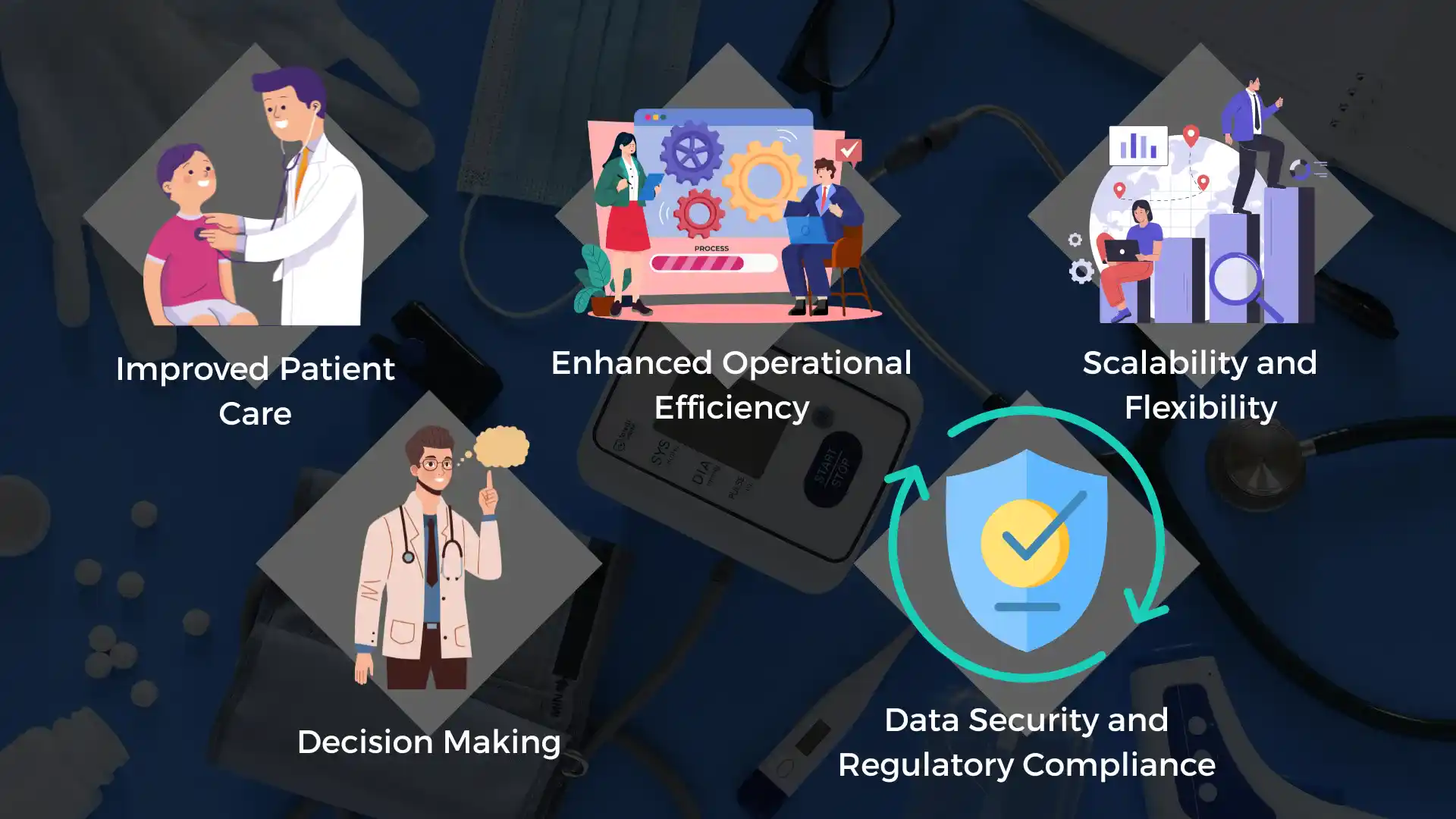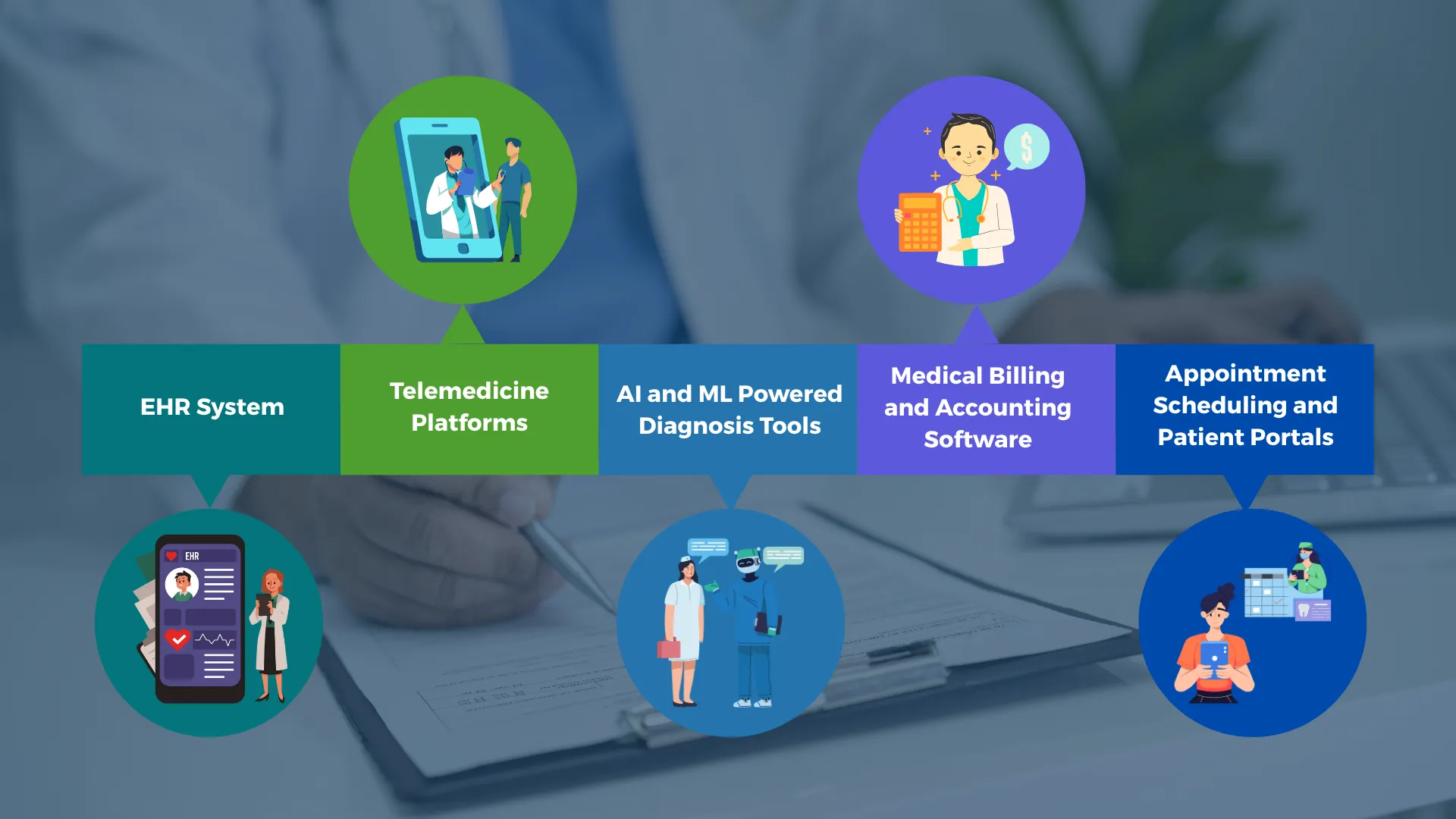Table of Contents
In this critical Digital Age, Software development for healthcare is not just a trend, it’s a necessity.
Customised digital solutions are the key to progress as patients’ expectations rise and technologies like IoT and AI become mainstream.
Healthcare Software development plays a vital role in reshaping the way medical services are delivered.
Why There Is a Need for Digital Transformation in Healthcare?
Patients demand faster services, telemedicine, personalized treatment plans, and easy access to their medical records.
At the same time healthcare providers must manage rigorous administrative tasks, maintaining data privacy regulation and quality care all together.
This is where software development for healthcare becomes indispensable. It enables healthcare organizations to adopt innovative digital technologies and discard outdated legacy systems.
What are the Key Drivers of Healthcare Software Development?
Here are 5 key drivers of healthcare software development:
1. Improved Patient Care and Engagement
Custom healthcare software solutions give better access to medical history, remote monitoring , and diagnostics using AI.
This innovation helps in faster, accurate and personalized care.
2. Enhanced Operational Efficiency
Healthcare software development automates routine and lengthy tasks like paperwork, and minimizes human error which allows staff to focus more on patient care. Implementing credentialing software for healthcare further streamlines administrative workflows by automating provider verification, compliance monitoring, and license management.
3. Decision Making
Data driven decision making can be done using analytics tools which compile years of data in mere minutes.
Modern healthcare platforms help in uncovering treatment patterns, monitor disease outbreak, and support clinical decisions in real time.
Errors are reduced as accuracy is around 50% to 100% .
4. Data Security and Regulatory Compliance
Data security is essential for building trust. Regulatory bodies like HIPAA and GDPR always strive for secure and compliant software development.
Custom healthcare software ensures that healthcare organizations stay up to date with regulatory changes.
5. Scalability and Flexibility
Evolving with ever growing technology and healthcare advancements needs tailored healthcare applications to easily adapt.
Scaling their operation to match emerging technologies like wearable integration, telehealth, and AI based diagnostics.

What are the Types of Healthcare Software Development Solutions?
Healthcare Software development encompasses a wide range of applications, including:
- Electronic Health Records (EHR) Systems – Patients histories, lab results and prescriptions all in one place, easy to access.
- Telemedicine Platforms – Reducing hospital visits and enabling virtual consultation.
- Appointment Scheduling and Patient Portals – Reducing administrative burden and enhancing patient engagement.
- AI and ML Powered Diagnosis Tools – Early disease detection and supporting clinical decisions.

What are the Benefits of Custom Software Development for Healthcare Providers?
- Tailored to Unique Needs – Custom healthcare software aligns with an organization’s specific needs and requirements unlike off the shelf solutions.
- Interoperability – Integration with existing medical devices and third-party systems ensures better communication between departments.
- Competitive Advantage – Powered with digital tools, healthcare providers gain a huge technical advantage.
- Faster Response to Crisis – In a pandemic stricken state, custom software allows rapid response and deployment of solutions to manage resources , safe guard patient data, and effective communication.
What are the Future Trends in Healthcare Software Development?
- Ai Driven Predictive healthcare
- Blockchain for Secure Medical Records
- IoT Enabled Health Monitoring
- AR/VR for Surgical Training and Patient Education
- Cloud Based Scalable Health Platforms
Real world examples from HyScaler Changing Healthcare Sector
We have contributed to healthcare sector and here are a few examples from our Case Studies
- EHR Integration for a Senior Living and Care Organization – We partnered with an organization who wanted EHR Integration.
- End-to-End Digital Transformation for Telemedicine Platform – We collaborated with a Telemedicine Platform who wanted to transform their platform which was based mainly on manual operations.
- Revolutionising Infertility Treatment with a Comprehensive EHR Solution: Advanced Integration and Scalability – Our client, a leading fertility clinic, wanted an end to end EHR system to manage their patients infertility treatment data effectively.
- Healthcare Operations: How EMR Boosted Performance and Productivity – Our client, a non governmental organization (NGO), was dedicated to combating tuberculosis (TB) and wanted an internet based management system to make it easier to create and maintain comprehensive medical records for patients and healthcare providers.
Also mentionable
Final Thoughts
Software development for healthcare is essential for patient care.
It is no longer optional but the cornerstone of modern medical care.
By investing in custom healthcare software development, organisations can improve healthcare delivery, patient satisfaction, streamline operations, ensure compliance, and above all stay ahead in this digitally competitive world.
The Future in Healthcare is Digital and it’s being built with code and care.
Frequently Asked Questions
What is the most popular healthcare software?
Electronic Health Record (EHR) is the most used healthcare software. EHR makes hand written records obsolete, it can be shared with other healthcare professionals and is very secure.
What is the Role of Software in Healthcare?
The role of Software is essential for Healthcare it helps in hospital administration to patient diagnosis here are the 7 Key Roles:
1. Improving Patient Care and Their Outcomes.
2. Streamling Hospital Operations.
3. Remote Monitoring and Enabling Telemedicine.
4. Enhancing Treatment and Diagnostics.
5. Ensuring Compliance and Data Security.
6. Easier Research and Data Analysis.
7. Driving Innovation.
What are the Benefits of SDLC in Healthcare?
Software Development Life Cycle offers significant benefits in healthcare such as:
1. Enhanced Patient Safety and Care Quality.
2. Improved Regulatory Compliance.
4. Smoother Integration with Systems.
5. Clear Road-map of Development and Deployment.
6. Early Risk and Error Detection.
7. User Friendly Design.
8. Easy Integration of New Technologies.
9. Continuous Maintenance and Improvement.
10. Accurate Data and Enhanced Decision Making.
11. Cost Efficient.
Which Software is used in healthcare?
Softwares used in healthcare are:
1. Electronic Health Records (EHR) -Collects and stores information of patients.
2. Medical Billing Software – Automating billing and easier insurance claims.
3. Medical Coding Software – Software for custom coding healthcare applications.
4. Medical Data Base Software – Similar to EHR but it is categorized by diseases not the patient’s profile.
5. Medical Research Software – Used for sharing research data and educating medical personnel.
6. Medical Diagnosis Software – Software to generate probable diagnosis.
7. Medical Imaging Software – Used to generate images and process MRI, CT and PET scans to print 3D models.
8. E Prescription Software – Used to track, renew and cancel medical prescriptions of patients.
9. Telemedicine Software – Enables medical professionals to consult patients remotely and video chat with them.
10. Booking Software – Easy scheduling of appointments online.
11. Picture Archiving and Communication System (PACS) – Secure software for sharing, storing and retrieving medical imaging files.
12. Hospital Management Software – Software for automating all the manual administrative hospital work.
13. Laboratory Information Management System (LIMS) – Software to manage laboratory work flows like test results or patient samples.
14. Medical Equipment Management Software – Software for automating inventory and getting regular updates of equipment for maintenance.
15. Clinical Decision Support System (CDSS) – Data analyser which helps in decision making.
16. Health Tracking Apps – Apps which Integrate IoT to track your health using wearable’s or other metrics.
17. Remote Patient Monitoring – For providing care in smaller clinics outside of well equipped healthcare centres.